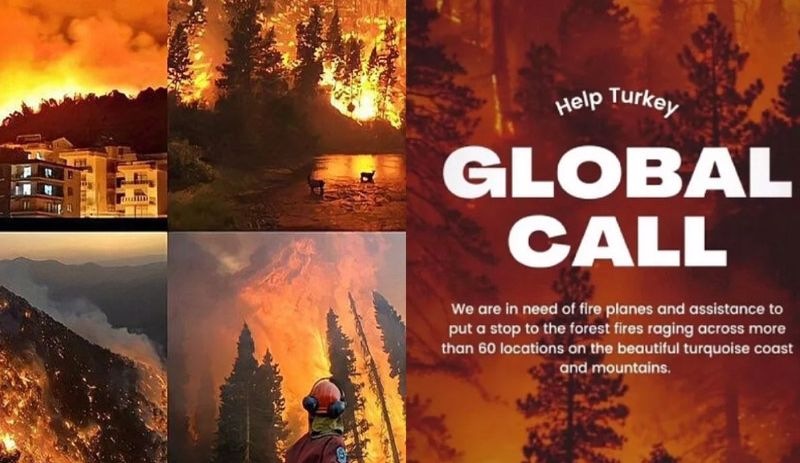It looked innocent enough.
As Turkey burned, ravaged by its deadliest and most destructive wildfires in living memory, #HelpTurkey began trending on Twitter, supported by sympathetic celebrities and traumatized Turks.
But in a deeply divided country where even minor events spark culture wars between President Recep Tayyip Erdoğan’s supporters and opponents, the hashtag turned into a scandal, leading to a prosecutors’ probe.
The powerful Turkish leader, unexpectedly facing one of the most serious challenges of his 18-year rule, sounded scandalized by the idea that his country needed help, even as the government revealed it no longer had functioning firefighting planes.
“In response to this, there’s only one thing we can say: Strong Turkey,” Erdoğan said after Friday prayers, mentioning a hashtag being circulated by his voters.
“A terror of lies is being spread from America, Europe and certain other places,” he said about the #HelpTurkey campaign.
Acting on Erdoğan’s anger, the prosecutors’ office said it would investigate whether the posts were designed “to create anxiety, fear and panic in the public, and to humiliate the Turkish government.”
Around the same time, the media regulator threatened to fine TV channels that continued airing live footage of the fires or running stories “that provoke fear and worries in the public”.
Most stations complied, minimizing their coverage of a disaster that has killed eight people, destroyed forests across vast swathes of the Mediterranean and Aegean coasts, and upturned the lives of a generation of farmers.
‘It looks fishy’
The uproar stemmed in part from Erdoğan’s proud nationalism, and in part from a perception among his opponents that cronyism and corruption were taking root.
Erdoğan’s fiercest critics charge that he sacked capable leaders from top positions in the purges that followed a failed coup attempt in 2016, replacing them with friends and allies who were not up to the job.
An energetic, hands-on leader who rose to power on a popular anti-graft campaign, Erdoğan’s own actions suddenly seemed out of touch.
Twitter exploded in outrage when he went on tour of the damaged region under heavy police escort, tossing bags of tea to locals out of a moving bus in the middle of the night while a megaphone announced his presence.
“Help us!!!!!” Turkish comedian Enis Arıkan tweeted hours after Erdoğan’s visit in a typical #HelpTurkey post. “We need planes urgently. We only have one world.”
In self-defense, the government is promoting a narrative that #HelpTurkey is being fanned by “sock puppets” — fake accounts designed to manipulate public opinion.
Marc Owen Jones, an assistant professor at Hamad bin Khalifa University in Qatar, told a media event organized by the presidency that his analysis showed up to five percent of the #HelpTurkey tweets being spread by such accounts.
“I don’t know the purpose of it. What I can say is that I guess the manipulation is happening of the hashtag… It looks fishy,” the British academic said.
“If it was started as a manipulation campaign it was very clever because #HelpTurkey is a really innocent message, you can understand why people tweeted. Why wouldn’t an average person want to help?”
Tightening the screws
Gareth Jenkins, a veteran Turkey analyst, said this criticism cuts both ways.
Erdoğan’s government “oversees thousands of fake accounts, which they use to troll and try to intimidate into silence anyone who questions its narratives,” Jenkins told AFP.
“But I think a much greater problem is that a large number of Turks, including many of those around Erdoğan, actually believe the regime’s propaganda.”
The battle over #HelpTurkey comes with the screws tightening on social media, which had remained an area of spirited debate in a country dominated by pro-government media and newspapers.
After initial resistance, Twitter, Facebook and others have complied with a new law requiring platforms to appoint local envoys who can handle court orders to take down contentious posts.
Erdoğan says his government will submit another bill to parliament in October to further regulate social media, although he has not explained how.
Yaman Akdeniz, a digital rights expert who questions the strength of Jones’s “sock puppet” analysis, said Turks’ pleas for outside assistance were “real and not a hoax.”
“While the hashtag wars continue on the social media platforms, the fires continue in real life,” Akdeniz told AFP.
“In reality, we have a seriously malfunctioning government machinery which in turn will undoubtedly introduce a new crime and law on disinformation to further silence critical voices on social media platforms,” he said.
AFP

